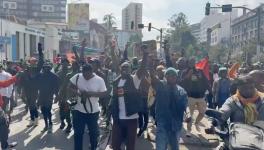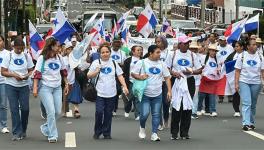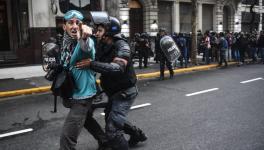Anti-government Protests in Chile Enter a Third Week
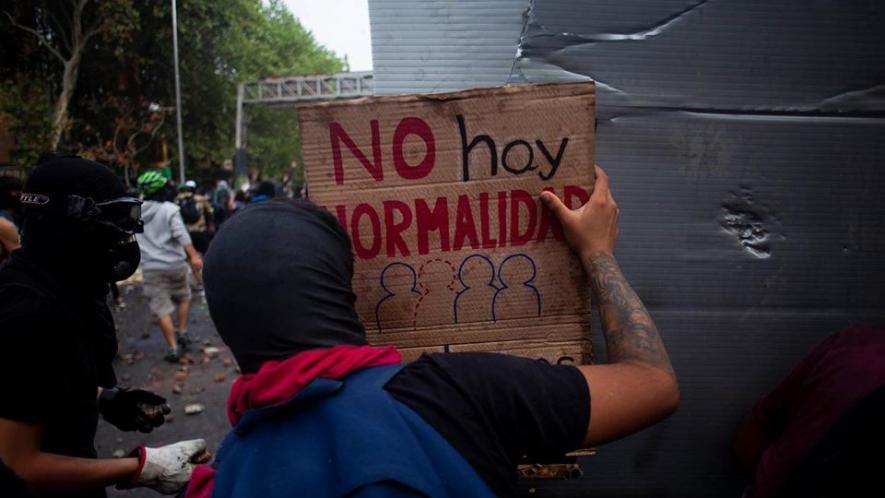
"There is no normality" Chileans continue to mobilize against the government of Sebastian Piñera and demand a National Constituent Assembly. Photo: Frente Fotográfico
While Chilean President Sebastián Piñera has claimed that normality has returned to Chile, protests in the country against the neoliberal policies imposed by his government entered a third week on November 4. As a part of the ‘Super Monday’ protest, called for by the Social Unity Board, tens of thousands of people once again took to the streets across the country, demanding the resignation of the president.
The Social Unity Board is a platform that brings together almost 100 social movements, students’ organizations and trade unions, including the Workers’ United Center (CUT), the National Association of Fiscal Employees (ANEF), etc. The board called on workers and people to hold different measures of protests, such as marches, demonstrations, cacerolazos* and roadblocks, throughout the country. The capital Santiago and the port city of Valparaiso were the epicenters of the massive mobilizations.
In the afternoon, hundreds of workers, activists, union and social leaders demonstrated outside the Former National Congress Building in Santiago and the Nation Congress of Chile in Valparaiso, to demand the legislators not to debate on the bills presented by Piñera’s administration that deepen the neoliberal model in the country.
They also demanded that a National Constituent Assembly be established, the government increase investment towards public services of health, housing, education and pensions, and the responsible police and military officials be punished for violating human rights during the repression of protests.
In the evening, in Santiago, once again thousands of people gathered at the Plaza Italia and peacefully marched along the Vicuña Mackenna Avenue with the aim to reach Plaza de los Heroes. However, in the mid-way, they were repressed by the national police force, the Carabineros. The Carabineros used tear gas and water cannons to suppress the protest.
The same day, Chilean human rights organizations and lawyers filed a legal complaint against President Piñera for carrying out systematic attacks against the civilian population during the last two weeks of social protests.
The Ombudsman’s Office, the People’s Defense Committee ‘Vergara Toledo Brothers’ and the Legal Cooperative went to the Seventh Court of Guarantee in Santiago to file a complaint against the president for the crime against humanity, established under Law 20,357.
The organizations demand that “that the described incidents be investigated” and that “the responsibility of President Sebastián Piñera be determined, as the perpetrator of the crime against humanity.”
According to a recently released report by the National Institute of Human Rights (INDH) in Chile, in the last 16 days of anti-government protests, due to police repression, over 23 people have been killed, 4,316 have been arrested,1,564 have been injured, 574 have been hospitalized due to serious injuries and 166 have been threatened, tortured or sexually harassed.
Feminist groups in Chile have carried out several protest actions to raise awareness to the abuses carried out by police officials and have deemed Chile ‘a patriarcal assassain state’. According to reports released by INDH, female detainees were forcibly undressed and forced to stand in the squat position. Several also denounced that security personnel touched them with their weapons and simulated penetration with their firearms. Rebeca Zamora of the Association of Feminist Lawyers of Chile said that security forces also threatened women with rape if they did not follow their orders, or even for participating in the protests.
Guatemalan human rights activist and Nobel Peace Prize winner, Rigoberta Menchú, arrived in Chile and expressed her concerns about the current situation of Human Rights in Chile. Menchú along with Joan Turner Jara, widow of Chilean revolutionary Víctor Jara, and Guillermo Whpei, president of the Foundation for Democracy, visited La Moneda, the Government Palace, and delivered a letter addressed to President Piñera on Monday November 4.
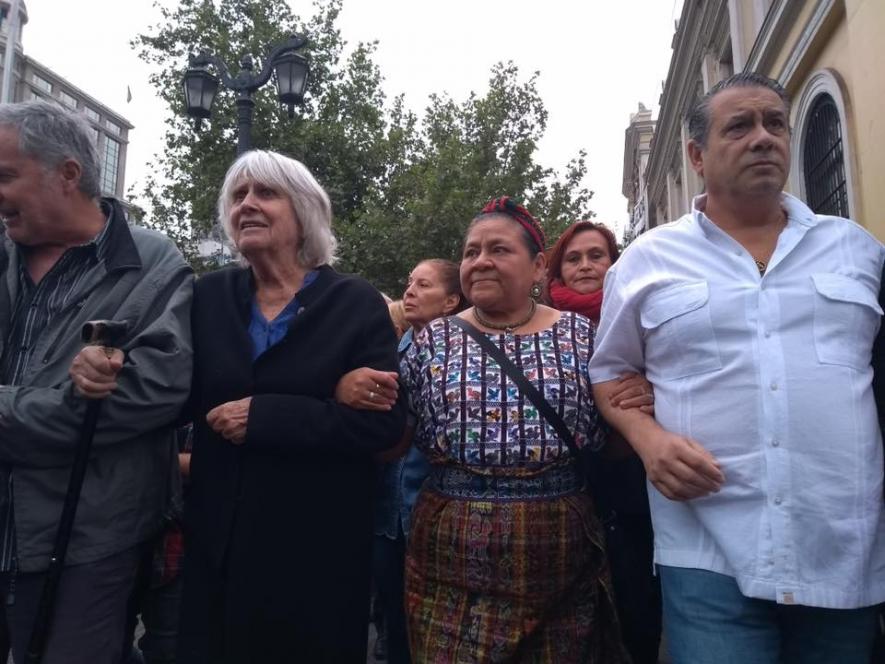
Rigoberta Menchú along with Joan Turner Jara, widow of Chilean revolutionary VÃctor Jara, and Guillermo Whpei, president of the Foundation for Democracy
In the letter, she requested an end to police violence, respect the constitutional right to protest of the citizens, open spaces for dialogue and begin the process for a Constituent Assembly, as demanded by the Chilean society.
The popular uprising was sparked by a high school students’ protest against the increase in the cost of public transportation services in the capital, but tapped into the broader social discontent in the country. Since October 18, broad sectors of Chilean society have been mobilizing in different parts of the country against the austerity measures promoted by Pinera’s administration and in repudiation of the strong repression of social protests. The majority of the Chilean population rejected the state of emergency and curfews declared in different regions of the country, which reminded people of the brutality of the last civic-military dictatorship under Augusto Pinochet.
However, despite several attempts by the government to curb their indignation and the violent repression by national police and military forces, defying state of emergency and curfews, Chileans continue to resist.
*Cacerolazos is a form of popular protest in which people make noise by banging pots, pans, and other utensils in order to call for attention.
Get the latest reports & analysis with people's perspective on Protests, movements & deep analytical videos, discussions of the current affairs in your Telegram app. Subscribe to NewsClick's Telegram channel & get Real-Time updates on stories, as they get published on our website.









